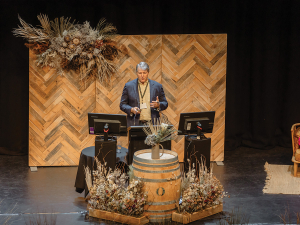Next Generation Viticulture: Capture more light to harvest more grapes
Transforming canopy management systems to maximise sunlight could increase vineyard profitability without compromising wine quality, says researchers.
 Dr Andrew Smith from the Rodale Institute discusses regenerative organic agriculture and the soil carbon solution. Photo Credit: Lisa Duncan.
Dr Andrew Smith from the Rodale Institute discusses regenerative organic agriculture and the soil carbon solution. Photo Credit: Lisa Duncan.
The Organic & Biodynamic Winegrowing Conference travelled from moon to mycorrhizae, in an event that married traditional wisdom with cutting edge science.
The conference, held in Blenheim over three days in June, involved 25 speakers, including scientists, winemakers, viticulturists and a Master Sommelier, canvassing everything from the health of soils, microbes and plants to the outcomes for wines, climate and market. The conference also included speakers dedicated to community, indigenous knowledge, and generational connections to place, including Elaine Chukan Brown, who emphasised the responsibility to her Unangan-Inupiaq ancestors in Alaska, and to many future generations to come. Dr Jessica Hutchings from Te Waka Kai Ora, the Māori Organics Authority, discussed food sovereignty, indigenous knowledge, and environmental wellbeing in New Zealand, and invited winegrowers to join the Hua Parakore Māori organics movement.
Organic Winegrowers New Zealand (OWNZ) executive committee member and conference co-chair Bart Arnst says those themes are pertinent to New Zealand's relatively young wine industry, with an intergenerational perspective asking owner to look beyond their current investment, at what the land needs for future success.
Enhancing the soil and mitigating climate change were key messages of both social and science discussions, including James Dicey presenting on his biochar trials in Central Otago, reinforced by Dr Vinay Pagay from the University of Adelaide, who shared research on the implementation and effects of biochar in organic vineyards. Dr Andrew Smith from the Rodale Institute discussed regenerative organic agriculture and its impact on soil carbon and sequestration, while Dr Hicham Ferhout from Agronutrition in France looked at rhizobacteria and endomycorrhizae and their role in plant and soil health.
Committee co-chair Nick Pett, Seresin Estate Winemaker, says the ability to connect and share with people at the heart of the industry was a highlight of the event for him, after a four-year conference hiatus due to Covid-19. "It felt like it had been such a long time since we were able to have everyone all together and have that short of energy and collaboration," he says, delighted to have found the audience open to every speaker, from scientific and technical presentations to more community-focussed discussions. "I think that was my standout moment - the buzz and energy of everyone after each season. Everyone was super enthusiastic."
Seresin Estate has been certified organic for around two decades, but Nick says there are always areas to improve, and he came away excited about changes for the future, including work on the vineyard system around fungi, mycorrhizae, regenerative management, and the integration of sheep. He'll also be taking a look at the company's wider impact, and how it can improve its footprint. "You look at what is happening in the world and we have to do something to help." That includes increasing carbon sequestration in soils, and considering bottle weights and shipping, he says. "Looking at the big picture. That's an area I am excited to be working on in the next stage of Seresin's journey."
Meanwhile the organising committee - packed with "great energy" - is already thinking about continuing the momentum, he says. "We're ready to lock in the date for the next one."
Horticentre Charitable Trust
The New Zealand Horticentre Charitable Trust awarded $10,000 to Organic Winegrowers New Zealand to bring eight vineyard growers to attend the Organic & Biodynamic Winegrowing Conference. Event organiser Naomi Galvin says cost is a major barrier for some delegates, and especially for smaller growers in distanced regions. "We wanted to see representation from all regions across New Zealand attend the conference, so it was fantastic." Representatives from Auckland, Hawke's Bay, Gisborne, Wairarapa, Marlborough, Nelson, North Canterbury, and Central Otago were selected to attend the conference. "The goal was for the recipients to go back to their peers to share what they learnt," Naomi says. "This technical knowledge transfer opportunity supports our nation's viticulturists to grow and thrive in an environment that is constantly changing."

Trade is important to our industry, whether it’s because 90% of our wine sales are in international markets, because of…

The end of the year is fast approaching, so here are some thoughts on a few of the significant developments…
Jimmy Stewart is quite literally chipping away at circularity.
A Wine Marlborough Lifetime Achievement Award is “very premature”, say Kevin and Kimberley Judd, nearly 43 years after they came…
Wine tourism has evolved into a sophisticated, diverse and resilient part of the New Zealand wine sector's economy. Emma Jenkins MW talks…